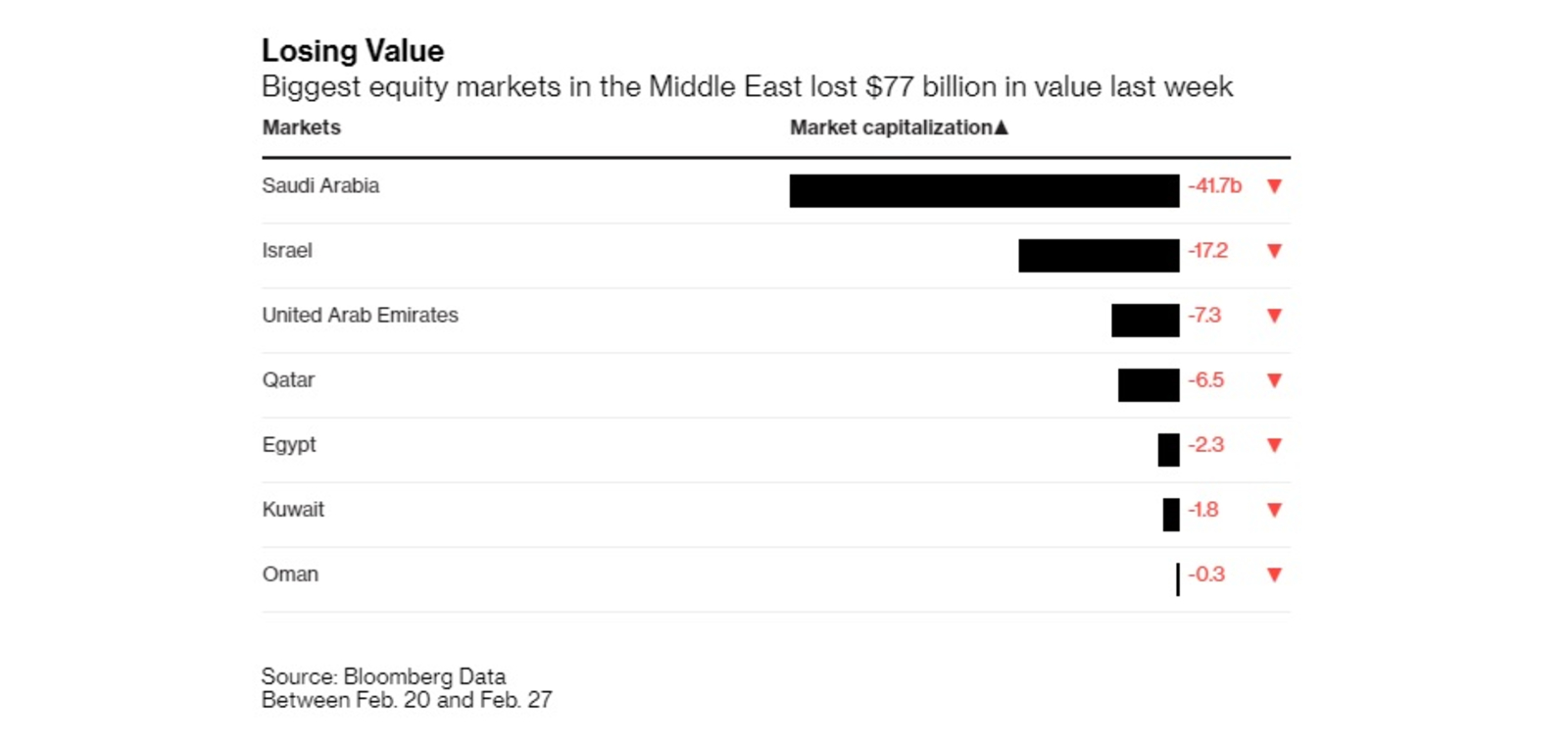EGX30 suffers worst day’s trading since 2012 as covid-19 outbreak hits Middle East stocks

EGX30 suffers worst day’s trading since 2012 as covid-19 outbreak hits Middle East stocks: The benchmark EGX30 index tumbled a bit more than 6% yesterday in its worst showing since 2012 as the spread of the covid-19 virus drove down oil prices and investors caught up with the Friday selldown in other markets. CIB, the index heavyweight, dropped 5.3% during the day and the wider EGX100 closed down 5.4%. Trading was halted for half an hour at 12:35 CLT after the market dropped more than 5%, triggering circuit breakers for the first time since last September.
From bad to worse: The EGX is coming off a poor February which saw the index fall 6% over the month. Most sectors finished in the red at the end of last week, making the index the fifth worst performer in the region, according to a note from Shuaa.
The EGX wasn’t the only MENA market to take a beating: Plummeting oil prices spooked investors and caused them to dump stocks in the oil-rich Gulf states. Kuwait’s index was the hardest hit, falling 11% after a three-day holiday last week. The Dubai index shed 4.5%, the Saudi Tadawul fell 3.7%, and the Abu Dhabi and Bahraini indices both dropped by more than 3%. Saudi Aramco shares finished 2.1% in the red, bringing the oil giant’s share price to its lowest level since its December IPO. Bloomberg has more.
Oil markets suffered their worst week since 2008 last week, with US crude plunging more than 15% to USD 45.25 per bbl and Brent falling 14.3% to USD 50.
Yesterday’s market turmoil came after global stock markets turned in their worst week since the 2008 financial crisis. Around USD 7 tn was wiped from markets around the world last week, with US indices alone losing USD 4.3 tn.
A prolonged international crisis over covid-19 threatens more than just Egyptian stock prices: Trade and supply chain disruptions, market turbulence and building economic uncertainty threaten to hit vital sources of government revenue and put pressure on its current account position. “All sources of hard currency, including revenues from the Suez Canal and tourism, and inflows from portfolio investment, will be affected by the decline in global trade,” Radwa El Swaify, head of research at Pharos, told Enterprise. “Even transfers from abroad will be hit, especially from Gulf countries due to the decline in oil prices.”
EGP reverses recent gains: The EGP continued to ease against the greenback yesterday, all but erasing gains seen in the week leading up to last month’s MPC meeting. The currency fell another 2 piasters yesterday to EGP 15.58/USD, continuing a slide that has seen it fall from a peak of 15.49 on 23 February. The trend could continue if portfolio investors trim their holdings of Egyptian treasuries and flee to safe haven assets, El Swaify says.
Government bond auction receives lukewarm response from investors: The Central Bank of Egypt sold less than half of the EGP 14.5 bn of three-month and nine-month treasury bills offered in an auction yesterday, official data shows. Investors bought just EGP 45 mn of three-month t-bills from the EGP 4 bn on offer after the central bank accepted a yield of 12.98%, almost 150 bps lower than the rate targeted by investors. Appetite for the higher-yielding nine-month tranche more than doubled the EGP 10.5 bn on offer, but the central bank sold only EGP 7.2 bn after offering an average 14.44% yield, below the 14.61% rate requested by investors. This is the second consecutive auction the government has failed to sell the targeted amount after falling short in last Thursday’s auction of six-month and one-year bills.
Analysts are going to be rethinking their interest rate forecasts: Analysts who spoke to Enterprise all agreed that any plans the CBE might have had to cut interest rates at the next MPC meeting in April will likely be taken off the table. Portfolio outflows could gather pace if the global equity selloff continues this week, and a rate cut next month could push more bondholders to liquidate their positions, increasing pressure on the government’s fiscal position, El Swaify said. Indeed, the central bank could even look at a rate hike to leave Egypt as attractive as possible to the carry trade, said Hany Genena, head of research at Prime Holding.
The silver lining: Plummeting oil prices will help to ease the pressure on the state’s finances in the event of a shortfall in revenues.
Government stimulus on the way? “The Finance Ministry will resort to some financial policies to support the economy without putting pressure on the state budget, provided that the CBE will resume using its tools immediately after the situation stabilizes by reducing interest rates,” Genena said. Shuaa’s Amr El Alfy said the government should move to soften the blow for the industrial sector by reviewing gas prices.
Or maybe not? A government official told the local press yesterday that it is not yet considering a stimulus package and will wait to assess the effects of the CBE’s recent multi-bn EGP initiatives to support the manufacturing and tourism sectors. Sources said that the Planning Ministry is evaluating whether fears over covid-19 will impact its growth forecasts, which see the economy growing at a 6% clip during the current fiscal year.
Does our fate rest in the hands of the Fed? Genena said that the extent to which the virus impacts the Egyptian economy will in large part be determined by the trajectory of the US economy and the decisions made by monetary policymakers in Washington. “The Fed hinted at the possibility of cutting interest rates faster than expected to stimulate the economy, and if the US economy remains stable, global growth and the rate of growth in Egypt will be kept safe,” he told Enterprise. “If the US is affected, we will be facing a global economic crisis.”